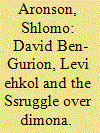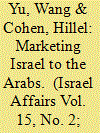|
|
|
Sort Order |
|
|
|
Items / Page
|
|
|
|
|
|
|
| Srl | Item |
| 1 |
ID:
087835


|
|
|
|
|
| Publication |
2009.
|
| Summary/Abstract |
The scholarly discussion of Israel's nuclear programme has reached a
degree of maturity, which allows some basics to become indisputable. As in
any other field of intense political-moral and strategic deliberations, the
role of Israel's nuclear programme, at first its very existence, were matters
of dispute or of different interpretations.1 Thus, this article will start with a
description and analysis of David Ben-Gurion's security policy based upon
his lessons learned from the Holocaust and Israel's War of Independence
combined and the ensuing deviations from it.
|
|
|
|
|
|
|
|
|
|
|
|
|
|
|
|
| 2 |
ID:
087837


|
|
|
|
|
| Publication |
2009.
|
| Summary/Abstract |
The American Jewish community was on the 'threshold of history', Israel
Knox wrote at the end of 1946.2 Regardless of time or place, Jewish selfperception
has always been complex and fraught with ambiguities. Until
recently a people with no option but Diaspora, it continuously sought to
define its nationhood in spiritual, cultural, territorial and racial contexts
and terms. Whenever these unresolved tensions encountered new
circumstances, ideas or dramatic events, the result was a period of
reassessment of personal and communal identity in relation to the changed
environment. It was at once a vague, varied and ever changing sense of self.
|
|
|
|
|
|
|
|
|
|
|
|
|
|
|
|
| 3 |
ID:
087836


|
|
|
|
|
| Publication |
2009.
|
| Summary/Abstract |
During the summer of 2007, public opinion in Israel was inflamed
over figures released by the IDF (Israel Defence Forces), according to
which 25 percent of potential Jewish male draftees do not take part in
military service, while the numbers among women are even higher
(about 40 percent). Furthermore, if one adds those men who do not
complete their service, the figure climbs to more than 40 percent.
These figures were at odds with the public and the military command's
expectations that the efforts to rehabilitate the army following the
weakness it had displayed in the Second Lebanon War (in the summer of
2006) would increase the motivation for recruitment.
|
|
|
|
|
|
|
|
|
|
|
|
|
|
|
|
| 4 |
ID:
087839


|
|
|
|
|
| Publication |
2009.
|
| Summary/Abstract |
Among multiple aspects of Israeli dominance over the Palestinians from
both sides of the Green Line, the ideological one appears as the single most
spectacular failure. Members of the Israeli establishment readily acknowledge
the notorious inefficiency of the Israeli public relations campaign in
Arabic.1 Although the Israeli Broadcast Authority (IBA) maintains radio
and TV broadcasts-and even attempted for a short while to launch a
Middle East Satellite Channel (2002-2005)-the overall impact of these
efforts on shaping Palestinian or, more generally, Arab public opinion
is negligible.2 The reasons for this failure are not difficult to assess: even
for the most sophisticated public relations campaign it would be difficult
to market Israel to the hostile Palestinian and Arab audience, particularly
to those who are direct victims of either occupation or discrimination.
But does this mean that efforts to present Israeli viewpoints to the Arab
public are meaningless and intrinsically doomed? To examine this
supposition, this article will analyze one of the most interesting attempts
of the Israeli authorities to communicate with the Palestinians through a
printed medium: the first seven years of the seventeen-year long life of
al-Anbaa (The News) newspaper (1968-1985).
|
|
|
|
|
|
|
|
|
|
|
|
|
|
|
|
| 5 |
ID:
087838


|
|
|
|
|
| Publication |
2009.
|
| Summary/Abstract |
In an unprecedented event of November 2008, Israeli leaders, and heads
of states from several Arab, Muslim and other countries attended a
United Nations conference in New York City on promoting a global
dialogue on religions, cultures and common values. The list of attendees
included the kings of Saudi Arabia and Jordan, the emirs of Kuwait and
Bahrain, the presidents of Israel, the United States, Finland, Pakistan and
Lebanon, and the prime ministers of Britain, Qatar, Morocco, the
United Arab Emirates, Djibouti, and Egypt. King Abdullah of Saudi Arabia
took the initiative to call for a meeting between Jewish, Christian, and
Muslim religious communities. The king discussed his ideas with the Pope
when he visited the Vatican in 2007.1
|
|
|
|
|
|
|
|
|
|
|
|
|
|
|
|
|
|
|
|
|